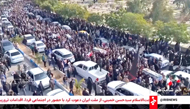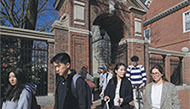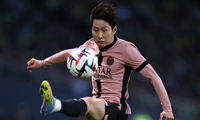▶ Los Angeles Survival(25)
▶ By Ellen Thun Copyright 2000
The family tree
There came the time for Haraboji when outer forces cracked his egg shell. He and three of his sons were leaving their homeland. Korea was no longer theirs. So he sent his sons to copy the family records, the genealogy so precious to old-timers like him. When they arrived in Hawaii to work in the sugar plantations, the records were put away; the papers lay away half a century in a box, then was found and translated. First by Tay Bong Kim, who came to the Islands to work for Korean Independence and became the owner of a tailor shop which prospered and enabled him to contribute to Korean National Association and become one of the leaders. The second was translated by a professional at the Michigan State University at Lansing. Kims is written in lay style, hence more readable, and begins, "I have reviewed your family tree ledger," and goes on to write about
1. Derivation of the surname: Dunn or Chun explained. In North Korea it is called "Dunn", in South Korea "Chun" due to variation of speech.
2. Origin of surname. Mr. Duk See Dunn was born to a family whose surname was "Char". His birthplace Damyang, a city in Kyung Sang Namdo. It was during the Koryo Dynasty prior to the Lee or Yi Dynasty. The king was Choongyul who ruled in the capital at Songdo (now Kaesong). It was here that young Duk See Dunn took the annual civil service examination (Literary Classics) and came out with high marks. This started him in government service, where he soon learned that his Korean name Char (which was not Chinese) held him back from promotion. Thus he changed the name Char to Dunn, a Chinese surname, which the family has used from Choongyuls reign, 700 years ago.
3. Family prominence or the generations in government positions: "Beginning with the first generation to the 13th generation, and 18th generation to the 27th generation, Dunn family line held government positions as governor of provinces, army general, secret service agency, judges and volunteer army leader during the abortive Japanese invasion in the time of Yi Dynasty, and other government positions."
The volunteer general during the Hideyoshi invasion was Dunn Soo Lok who died with 2000 of his men in the famous "Yim Chin (Jin) War" and who was responsible for organizing the volunteer forces. The 3-day standoff by the volunteers kept the Japanese soldiers from overcoming the Korean king, who was able to reach Pyongyang where the Chinese army awaited to rescue him. The volunteers fought with pikes, lances, and boulders. The boulders were rolled down the hillside as cavalry charges were made by the enemy. But the enemy had artillery fire and soldiers using firearms that eventually wore down the thin line of Koreans. It was 25,000 Japanese against the 2000. Overwhelming odds! But the small number saved the day. It was another 200 years before the Japanese attacked en masse in Korea.
Concluding Tay Bong Kim translation: "From the 14th generation there was nothing of significance on record. Also from the 24th generation to the 27th, ending with your great grandfather there is no record to mention." (Reference is made for Basil Dunn.)
4. Migration to the north: After Damyang, the family moved north where the family lived for generations. They gradually moved north following their appointment in government. Finally they made their domicile in Pyongyang and northern areas; hence their speech, manner of living and custom followed the lifestyle of north Korea. Areas where the Dunns lived or moved to were Soon Chun, Moo Chang, Chang Sung, Moo An, Yang Hung, etc.
The families the Dunn ancestors married into were Park, Lee, Choi, Char, Kim, Chang, etc. Women folks were usually considered chattel, or listed with household goods. (Chattel, indeed!)
5. Background explanation. "In Old Korea only those who were proficient in the Literary Classics were given the title Yangbans (upper class) and given government posts. Others, such as farmers, artisans and merchants, though essential, were looked upon as beneath their (upper class) dignity and esteem. Thus Korea was often called a nation of scholars. Japan, a nation of warriors, and Chinese a nation of merchants. In any generation where no record was provided, it can be assumed the Dunns were commoners.
One other section is the detailed instructions on marriages, proposals, and ceremonies about funeral rituals and have no connection with the family. This ends the summary of Tay Bong Kim translation.
Haraboji goes home
Grandfather decided to go home to die. He was satisfied. He worked with women and children, the old men like him, weeding and hoeing at small chores around the plantation. The lunas, "bosses", did not want old men hampering them getting the job done. But he was able to add to the slim income of the family; now he was ready to go home. His grandson, stateside, wrote he was heading for Gen. Robert E. Lee academy to become a soldier. Haraboji was in his mid 70s; he said farewell. His second son was wealthy, lived like a yangban although the title no longer was used in Korea. He told Nak Joon, his oldest, he would go home and become a burden on the rich son in old age; the son could well afford to care for him. (The old sinner still lurked in Haraboji, thinking about burdening his one wealthy son!) Haraboji lived until 1933. He was 93.
And afterwards
In the late 1980s, Korean students attending Yonsei University summer session, found a national archival (Seoul) reprint to use with the translations I had. It had greater detail than the records I had. A Korean minister, Kyungson Lee of the Camarillo Korean United Methodist Church, was able to give more information about genealogical records. He found that Duk See Dunn, the one called the first ancestor under Choongyul rule, ranked fifth with 18 competitors in the national scholars examination. He also explained about Jun Woo (variation of Chun or Dunn) born 1841, died 1922. He compared this distant relative to Haraboji, born 1840-1933. They were contemporary, but how different their lives. Lee translation also detailed what the records wrote about the relative Jun Woo: Jun had a title at work; he was called "JA or Ja Myung. When he traveled in official capacity, he was called HO or Ho Min Jee. His root name (Dam Yang) Bon Kwan. His position name was Gam Yuk (it means third person in charge of the county, which suggests he was a secretary.)
With so many names to answer to, Korean government service personnel must have difficulty keeping track of himself! Mr. Lee doing the translation said Jun Woo had these "nicknames" so that his true name was never used. It was not correct to refer or address him as Jun Woo.
Which brings me back to my father when I asked what was his mother name. He smiled and said, "When she was baptized Christian, she called herself Abigail." Then he said the names of dead persons were not to be used. He did not explain. Being Korean is complicated business, I do believe.
스마터리빙
more [ 건강]
[ 건강]이제 혈관 건강도 챙기자!
[현대해운]우리 눈에 보이지 않기 때문에 혈관 건강을 챙기는 것은 결코 쉽지 않은데요. 여러분은 혈관 건강을 유지하기 위해 어떤 노력을 하시나요?
 [ 건강]
[ 건강]내 몸이 건강해지는 과일궁합
 [ 라이프]
[ 라이프]벌레야 물럿거라! 천연 해충제 만들기
 [ 건강]
[ 건강]혈압 낮추는데 좋은 식품
[현대해운]혈관 건강은 주로 노화가 진행되면서 지켜야 할 문제라고 인식되어 왔습니다. 최근 생활 패턴과 식생활의 변화로 혈관의 노화 진행이 빨라지고
사람·사람들
more
[한인단체 신년 인터뷰] KYCC 송정호 관장… “지역사회 위한 종합 서비스 강화”
LA 한인타운 대표 비영리단체 한인타운청소년회관(KYCC)의 송정호 관장은 “지금 우리가 하는 일은 커뮤니티 ‘니즈’가 있기 때문에 존재한다”…

[한인단체 신년 인터뷰] LA 평통 장병우 회장… “본연 역할로 한반도 평화 실질 기여”
민주평화통일자문회의 LA협의회(이하 LA 평통) 장병우 회장은 6일 본보와의 신년 인터뷰에서 붉은 말의 해인 병오년 새해를 맞아 신년 화두로 …
워싱턴주에 첫 한인 시의장
워싱턴주에서 첫 한인 시의회 의장이 탄생했다. 제이슨 문(한국명 문태원) 머킬티오 시의원이 새해 들어 시의장으로 선출되며 또 하나의 중책을 맡…
국회 방문단 대한인국민회 방문
윤후덕·이해식·김한규 의원과 조오섭 국회의장 비서실장 등 10여 명의 한국 국회방문단이 지난 5일 LA를 찾아 로즈데일 묘지와 국민회관 등 미…
[한인단체 신년 인터뷰] 명원식 파바월드 회장… …
“한인 차세대들이 바르게 자랄 수 있는 토대를 만드는 것이 제가 파바월드의 회장으로 존재하는 유일한 이유입니다”한인사회의 대표적 청소년 봉사 …
많이 본 기사
- 트럼프 압박에 파월 ‘발끈’…사상초유 대통령-연준의장 정면충돌
- 트럼프 “이민자 시민권도 박탈한다” 1
- ‘불법명령 거부’ 촉구 의원, 軍계급강등 추진 美국방에 소송
- “미국에 집 2채” 전태풍, 놀고 먹는 남편..음주가무에 흡연까지 [동상이몽2]
- ‘침대변론’에 미뤄진 尹 내란혐의 구형 나온다…오늘 결심공판
- 메타, 사장에 트럼프 행정부 출신 영입…트럼프 “훌륭한 선택”
- 이란, 시위에 코너 몰렸나… “美와 소통 중, 핵협상 고려”
- 베네수 야권 지지 주저해온 트럼프, 15일 ‘노벨상’ 마차도 만난다
- 백악관, 이란 관련 “외교가 제1옵션이나 군사옵션도 주저안해”
- “이란 시위로 648명 사망…6천명 넘게 숨졌을 가능성”
- 트럼프, ‘그린란드 야욕’에 나토균열 거론되자 “내가 나토 살려”
- 美당국자 “北사이버 불법활동, 美최우선과제…작년 20억 달러 탈취”
- 베베네수, 수감자 117명 추가 석방… “마두로 뜻” 강조
- “최대 6천불 추가 공제돼요”
- “美-대만 무역협상 곧 타결…관세 15%로↓·TSMC 美투자 확대”
- 트럼프 ‘카드금리 제한’ 추진에 美은행·카드사 주가 급락세
- 멕시코 대통령 “트럼프와 통화…美군사개입 없을 것”
- H-1B 비자 등 최대 3천달러 육박… 1
- ‘단전단수 지시’ 이상민 징역 15년… 1
- 국힘, 5년 반 만에 당명 바꾼다…1… 2
- “집값보다 무서운 유지비”… 올해도 재산세·보험료↑
- LA 길거리 매춘 단속 대폭 강화… “고객도 처벌”
- 연방정부, 베네수엘라 미국민 즉시출국 권고
- 국제 금값, 연준의장 기소위협에 3%↑…최고치 경신
- “항상, 뉴진스가.. “다니엘, 눈물로 전한 ‘퇴출’ 심경
- 은퇴 고민하던 보아, 25년만 결국 SM 떠난다.. “자부심이자 자랑이었다”
- “귀화 시민권 박탈 기준 검토” 파장 1
- 애플, AI파트너로 구글 제미나이 낙점…구글 시총 4조달러 돌파
- 3월 20일 완전체 컴백.. ‘지금의 방탄소년단’이 들려줄 새 이야기는?
- 에어프레미아, 연중 최대 할인
- ‘코요테 주의’… 남가주 주택가서 급증
- 與 윤리심판원, ‘비위 의혹’ 김병기 제명 의결… “중대성 고려”
- 파라마운트, 인수 제안 거부되자 워너브러더스에 소송
- VA 페어팩스 세금 폭탄에 기업·주민‘탈출 러시’우려
- “한인 프리스쿨서 4세 여아 성추행 피해” 주장
- 재외국민 4분의 1이 노인 ‘초고령 사회’
- “모기지 금리 인하 위해 2,000억달러 투입”
- 내 개인정보 모두 다크웹에?… 지금 당장 해야 할 일들
- “이정후, 빨리 우익수로 옮겨라!” SF 담당 베테랑 기자, 구단 ‘외야 플랜 실패’ 맹비판
- 제5회‘정지용 해외문학상’공모
- 무분별한 이민단속 제한입법 탄력
- 타운 구리선 절도 기승… 어두운 밤거리 ‘치안 불안’
- ‘좀비(zombie)체제’가 무너질 … 2
- ‘PSG 희망’ 이강인, 드디어 ‘나홀로 훈련’ 돌입... ‘파리 더비’는 결장 유력→랑스 원정 복귀하나
- 뉴욕시 400만 달러 투입 공중화장실… 1
- 케데헌 ‘골든’ 글로브 이어 K팝 최초 그래미 수상도 노린다..로제 ‘APT’와 맞대결
- 李대통령 “日수산물 수입 중요의제…日北, 수교관계로 발전해야”
- 인앤아웃서 100달러 위폐 12개 매장 사용 2명 체포
- “김치 섭취 건강에 유익” 미 정부 식단지침 권고
- 뉴욕시 신호위반 단속카메라 늘린다
1/5지식톡

-
 한국 안경을 무료 배송으로 받아보실…
0
한국 안경을 무료 배송으로 받아보실…
0안녕하세요. 서울 안암동에 위치한 ‘보고싶다 안경원’입니다.저희는 다년간 한국 고객분들께 착용감 좋은 안경테와 한국안경브랜드,고압축 도수 렌즈를 합리적인 가격에 제공해온 안경 전문점입니다.이번에 해외 배송이 가능해…
-
 미 육군 사관학교 West Poin…
0
미 육군 사관학교 West Poin…
0https://youtu.be/SxD8cEhNV6Q연락처:wpkapca@gmail.comJohn Choi: 714-716-6414West Point 합격증을 받으셨나요?미 육군사관학교 West Point 학부모 모…
-
 ☝️해외에서도 가능한 한국어 선생님…
0
☝️해외에서도 가능한 한국어 선생님…
0이 영상 하나면 충분합니다!♥️상담신청문의♥️☝️ 문의 폭주로 '선착순 상담'만 진행합니다.☎️ : 02-6213-9094✨카카오톡ID : @GOODEDU77 (@골뱅이 꼭 붙여주셔야합니다…
-
 테슬라 자동차 시트커버 장착
0
테슬라 자동차 시트커버 장착
0테슬라 시트커버, 사놓고 아직 못 씌우셨죠?장착이 생각보다 쉽지 않습니다.20년 경력 전문가에게 맡기세요 — 깔끔하고 딱 맞게 장착해드립니다!장착비용:앞좌석: $40뒷좌석: $60앞·뒷좌석 …
-
 식당용 부탄가스
0
식당용 부탄가스
0식당용 부탄가스 홀세일 합니다 로스앤젤레스 다운타운 픽업 가능 안녕 하세요?강아지 & 고양이 모든 애완동물 / 반려동물 식품 & 모든 애완동물/반려동물 관련 제품들 전문적으로 홀세일/취급하는 회사 입니다 100% …
케이타운 1번가
오피니언
 옥세철 논설위원
옥세철 논설위원‘좀비(zombie)체제’가 무너질 때…

돈로 독트린
 조지 F·윌 워싱턴포스트 칼럼니스트
조지 F·윌 워싱턴포스트 칼럼니스트 [조지 F. 윌 칼럼] 트럼프의 무면허 괴물 사냥
 전지은 수필가
전지은 수필가 승리의 여신은 언제까지?
 신경립 / 서울경제 논설위원
신경립 / 서울경제 논설위원[만화경] 그린란드의 하얀 금

무분별 이민 단속이 불러온 비극

무면허 건축업자 피해 근절돼야
 메건 매카들 워싱턴포스트 칼럼니스트
메건 매카들 워싱턴포스트 칼럼니스트 [메건 매카들 칼럼] 마두로는 체포했지만… 베네수엘라 석유 생산 회복은?
 김미선 서북미문인협회 회장시인
김미선 서북미문인협회 회장시인 [한국춘추] 새해, 북방의 한국인을 생각하며
1/3지사별 뉴스

‘ICE 총격’ 주말 미 전역 항의 시위
미네소타주 미니애폴리스에서 연방 이민세관단속국(ICE) 요원의 총격에 30대 시민권자 여성이 사망한 사건에 항의하는 대규모 시위가 주말동안 뉴…
“귀화 시민권 박탈 기준 검토” 파장

새 VA 주지사는 의원을 좋아해
민주당 아비가일 스팬버거(Abigail Spanberger) 버지니아 주지사 당선자는 오는 17일 취임을 앞두고 내각 인선을 거의 마무리한 상…
VA 페어팩스 세금 폭탄에 기업·주민‘탈출 러시’우려

트럼프 압박에 파월 ‘발끈’…사상초유 대통령-연준의장 정면충돌
트럼프 대통령과 중앙은행 수장이 정면 충돌하는 사상 초유의 상황이 전개되고 있다.제롬 파월 연방준비제도(Fed·연준) 의장이 자신을 겨냥한 도…
살림으로 뿌리내리다- 테이크루트 안미정 대표의 요리 이야기 (9)

오늘 하루 이 창 열지 않음 닫기 


















































.png)


댓글 안에 당신의 성숙함도 담아 주세요.
'오늘의 한마디'는 기사에 대하여 자신의 생각을 말하고 남의 생각을 들으며 서로 다양한 의견을 나누는 공간입니다. 그러나 간혹 불건전한 내용을 올리시는 분들이 계셔서 건전한 인터넷문화 정착을 위해 아래와 같은 운영원칙을 적용합니다.
자체 모니터링을 통해 아래에 해당하는 내용이 포함된 댓글이 발견되면 예고없이 삭제 조치를 하겠습니다.
불건전한 댓글을 올리거나, 이름에 비속어 및 상대방의 불쾌감을 주는 단어를 사용, 유명인 또는 특정 일반인을 사칭하는 경우 이용에 대한 차단 제재를 받을 수 있습니다. 차단될 경우, 일주일간 댓글을 달수 없게 됩니다.
명예훼손, 개인정보 유출, 욕설 등 법률에 위반되는 댓글은 관계 법령에 의거 민형사상 처벌을 받을 수 있으니 이용에 주의를 부탁드립니다.
Close
x